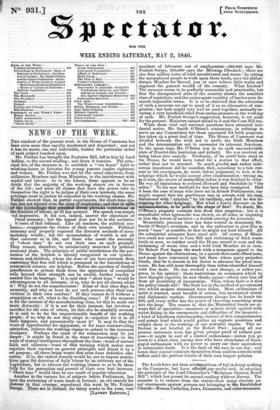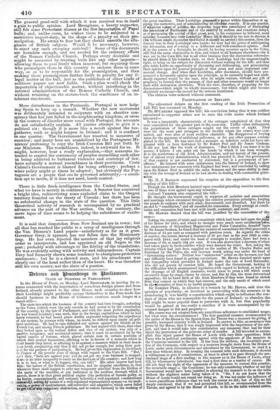NEWS OF THE WEEK.
THE conduct of the present week in the House of Commons has been even more than usually incoherent and disjointed ; and yet it has its moral, one and indivisible, besides the particular moral of each subject touched upon.
Mr. Fielden has brought the Factories Bill, left to him by Lord
Ashley, to the second reading ; and there it remains. The prin- cipal aim of the measure is, to establish a "ten hours" limit to working-hours in factories for young persons (under eighteen) and women. Mr. Fielden was met by the usual objections, from utilitarian Members and from Ministers, to the interference with capital and labour. As to the labour, there appears to be no doubt that the majority of the working classes are in favour of the bill ; and since all classes that have the power take to themselves the right to be judges of their own interests, the same privilege must in justice be conceded to the working classes. Mr. Fielden showed that, in partial experiments, the short-time sys- tem has not injured even the class of employers ; and that in spite of the forebodings that preceded divers previous restrictions on the duration of labour, no ill has accrued. His speech was simple ,nd impressive. It did not, indeed, answer the objections of 1;tical economy ; but the appeal does not lie to the exclusive , inTuent of that tribunal. Like all teachers, the political eco- nomy., exaggerate the claims of their own science. Political economy may properly expound the directest methods of accu- mulating wealth ; but the accumulation of wealth is not all that concerns us in life, and those who assert the necessity of "short time " do not rest their case on such grounds. "They cannot, therefore, be satisfactorily answered by political economy alone. The principle of public interference for the pro- tection of the helpless is already recognized in our system : women and children, whom the state of our laws prevents from exercising that free will which is presumed in the calculations of economical science, are helpless. Before the question of further interference to protect them from the oppression of compelled toils beyond their strength can be settled, further inquiry is needed into its bearings. It is said that "short time" would be advantageous to all interests : if so, why do not all classes adopt it ? Why do not the manufacturers? Some of that class Urge its necessity., and why at least do not such persons obey their con- victions in their own conduct ? If they cannot do it without a compulsion on all, what is the disabling cause? If the measure is for the interest of the manufacturing class, let this be made out more distinctly : if it is not for their interest, but involves a sacrifice for the sake of others, let this also be manfully avowed. It is said to be for the unquestionable benefit of the working people : if so, why do not they adopt it—stipulate for it in all their bargains, and peremptorily exact it? It maY be that the want of opportunities for enjoyment, or for some countervailing attraction, induces the working classes to submit to the incessant drudgery. Perhaps the cause of the submission may lie yet deeper : it might be found in the want of knowledge—in the want of Mutual intelligence throughout the class—want of mutual faith and adhesion—want of that training which makes men regulate their conduct on general principles and direct it by a set purpose ; all these being wants that arise from defective edu- cation. If so, the radical remedy would be, not to impose restric- tions upon the duration of daily labour by an arbitrary act of the Legislature, but to educate the working classes so as to fit them fully for the perception and pursuit of their own best interests. " Short time " would then be one result of popular education.
Another in the various list of subjects before Parliament, has been the reclaiming of waste lands in Ireland ; an old remedy for distress iri that country, reproduced this week by Mr. Poulett Scrope. There are in Ireland, for thirty weeks in the year, vast
numbers of labourers out of employment-585,000 says Mr. Poulett Scrope, 200,000 says the _Morning Chronicle; there are also four million acres of land uncultivated and waste : by setting the unemployed people to work upon those lands, says the philan- thropic Member for Stroud, you at once relieve their wants and augment the general wealth of the country. What hinders The measure seems to be perfectly- reasonable and practicable, but that the disorganized state of the country, alarms the sensitive class of capitalists, and the extravagant cupidity of landowners de- mands impossible terms. It is to be observed that the advocates of such a measure are apt to speak of it as an alternative of emi- gration; but both might very well be used together, mutually se- curing a very beneficial relief from undue pressure on the working of each. Mr. Poulett Scrope's suggestion, however, is set aside for the present: Ministers cannot attend to it and the Corn Bill too.
While these vital and national questions have attracted inci- dental notice, Mr. Smith O'Brien's contumacy, in refusing to serve on any Committees but those appointed for Irish purposes, has taken up a great deal of time. The House of Commons was divided between the wish not to nettle the Irish Members and the determination not to surrender its inherent functions. In the mean time, Mr. O'Brien was in no such uncomfortable state of Hamlet-like hesitation and dubiety. He was resolved on being taken into custody. Evidently, if he could have staid in the House, he would have voted for a motion to that effect, rather than not be arrested. So much gleeful and rather inde- corous impatience did he manifest, that, according to a tale cur- rent in the newspapers, he went, before judgment, to look at the lodgings which he would occupy after condemnation—trying on, as it were, the crown of martyrdom before it was finished to order. He was all impatience to succeed Howard and Stockdale in "'the cellar." To ins new landlord he has been duly consigned. Had it been the case of some who have sat in former Parliaments, one might suspect that the gentleman was in arrears with his rent, threatened with " eviction " by his landlady, and that he was in- triguing for other lodgings. But what a heavy discount on the accommodation, to be paid in the shape of fees ! No doubt, Mr. O'Brien's property exempts him from that suspicion ; but it is remarkable what agreement was shown, on all sides, in imputing to him the lowest of motives—a foolish craving for notoriety. Meanwhile, precious time has been wasted in discussing Mr. Smith O'Brien's crotchets, and in the endeavour to give him as much " rope " as possible, so that he might not hurt himself. All the substantial measures have stood still. Of course, if Minis- ters could not attend to Corn Bill and reclaiming of Irish waste lands at once, so neither could the House attend to corn and the reclaiming of waste time and a wild Irish Member all at once. Sir Robert Peel began the week with a temperate appeal to the House against the obstructions, in a speech that could offend none, and must have convinced any but those whom party prejudice blinds, that he is sincere in his desire to advance the great mea- sures. He has still more thoroughly than before identified himself with free trade. He has avowed a new change, or rather pro- gress, in his opinion : those restrictions on commerce which he once thought impolitic he now thinks unjust—which cuts him off from all possibility of compromise. Then, whose fault is it that the policy stands still! The fault lies in the method of government into which modern statesmen have fallen. More enthusiasm of spirit is wanted, more breadth of action, less mechanical nicety and diplomatic caution. Government always has its hands too full, and every trifler has the power of throwing something more into the heap. The reason is, that the Ministerial hands are al- ways full of specialties—measures of minute detail applied with nicest fitting to the emergencies and difficulties of the moment- a kind of handloom statesmanship, instead of that comprehensive and potent kind which would gather up cognate questions and subject them to the working ot one powerful engine. This re- flection is not levelled at Sir Robert Peel : among all our present statesmen none has given greater proof of earnest pur- pose—it might be said of a limited enthusiasm—unless you go down to a lower class, among men who have abundance of disen- gamed enthusiasm with no power to carry out their aspirations in substantial deeds. It is the fault of the race in our day; and hence they cannot extricate themselves from endless contests with triflers amid the pettiest details of their own largest policies.
••••■■■■
The Lords have not been sOng*tatious of toil in doing nothing as the Commons, but have effectihl one useful task, in adopting
the principle of the Lord Chancellor's " Religious Opinion ReliefBill '; which has passed its second reading without dissent. The measure is to remove from the statute-book many obsolete pe- nal enactments against persons not belonging to the Established Church—Roman Catholics, Jews, Dissenters, and otherrecusants. The .general good-will with which it was received was in itself
a to public opinion. Lord Brougham, a hearty supporter, still felt some Protestant alarms at the free importation of Thipal bulls ; and, unlike oxen, he wishes them to be subjected to a i restrictive import-duty, n the shape of a penalty on their pro- mulgation. He seems to fear lest they should unsettle the alle- giance of British subjects. Would it be necessary, however, to enact any such sweeping anti-bull? Some of the documents are harmless enough, and are needed for the ordinary affairs of the Roman Catholic Church. Perhaps every desirable end might be answered by treating bulls like any other imports— allowing them to pass freely when innocent, but requiring those tvho promulgate them in this country to endorse them in some way, so as to be responsible for the promulgation, and then making those promulgators further liable to penalty for any il- legal matter in the bull, just as the publishers of other kinds of seditious papers are now liable. Such a plan would check the importation of objectionable matter, without interfering in the internal administration of the Roman Catholic Church, and without retaining on the statute-book the semblance of an in- tolerant enactment.



















































